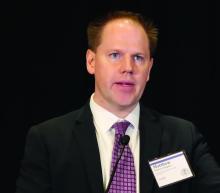Genetic advances push personalization of cancer prevention
EXPERT ANALYSIS FROM THE 2017 AGA TECH SUMMIT
Genetic testing for GI cancer risk
“We have to be honest with ourselves about the limitations,” said Dr. Yurgelun, who expressed concern about how some of the commercially available multigene panels are being marketed and employed by both patients and physicians.
Despite the expectations of those without experience interpreting the results, “genetic testing often fails to give a black and white answer,” Dr. Yurgelun said in an interview. “Finding an inherited mutation in a cancer susceptibility gene carries plenty of uncertainty in many cases.”
One issue for interpretation of multigene panels involves variants of uncertain significance (VUS). These are germline genetic alterations that have been observed in individuals undergoing genetic testing but have not been confirmed as causative of inherited cancer risk.
“VUS are findings for which data are insufficient to classify them as either pathogenic or benign, and there’s significant concern about both patients and clinicians overinterpreting or misinterpreting their significance,” Dr. Yurgelun cautioned. In particular, aggressive intervention undertaken because of a VUS could introduce risk without benefit. He cited a recently published article that documented aggressive surgical management in the presence of VUS mutations “even though their genetic testing really should not have dictated that.”
Even when a mutation is present with a clear association with increased cancer risk, penetrance is another concept that may not be fully appreciated in gene panel interpretation. Penetrance expresses the proportion of patients with that mutation who will develop a cancer with which the gene mutation is associated.
“An inherited mutation in a cancer susceptibility gene influences their probability of developing cancer, but the odds are never zero and they are essentially never 100%,” Dr. Yurgelun explained. “Genetics is not necessarily destiny,” he added.
Genetic testing is important now, and its clinical value is improving, Dr. Yurgelun emphasized, but he cautioned that the “explosion in the availability of genetic testing” has the potential to cause unrealistic expectations and the potential for misuse of the information.
“Clinicians should expect to still encounter lots of uncertainty with genetic testing, which is why it’s so critically important that such testing be done with the guidance of professional genetic counselors who can help navigate many of these uncertainties. While our technology now allows for a tremendous breadth of genetic testing options, these options have hugely expanded the number of questions and the amount of uncertainty that can be generated,” he added.
Heidi Splete contributed to this report.








